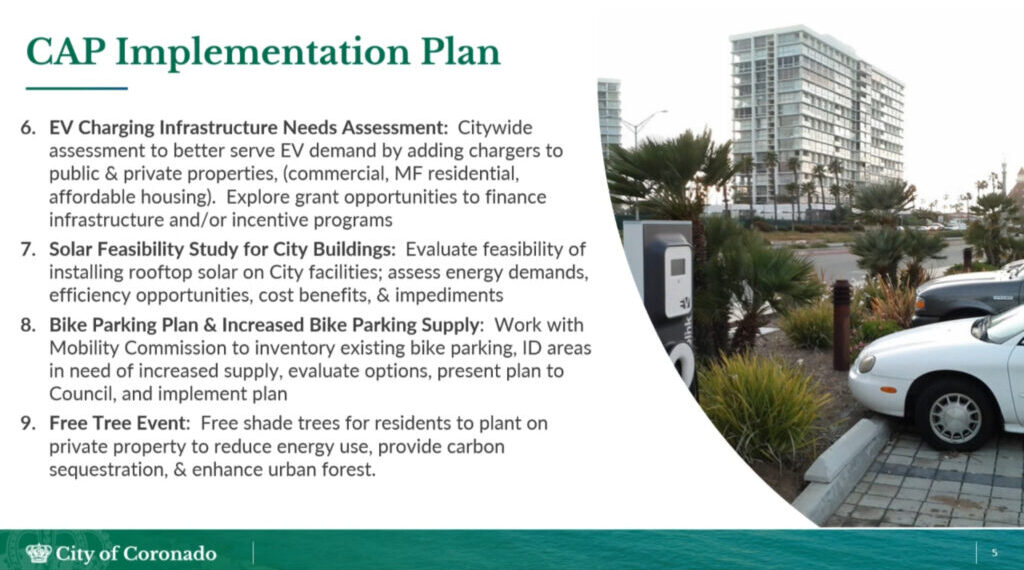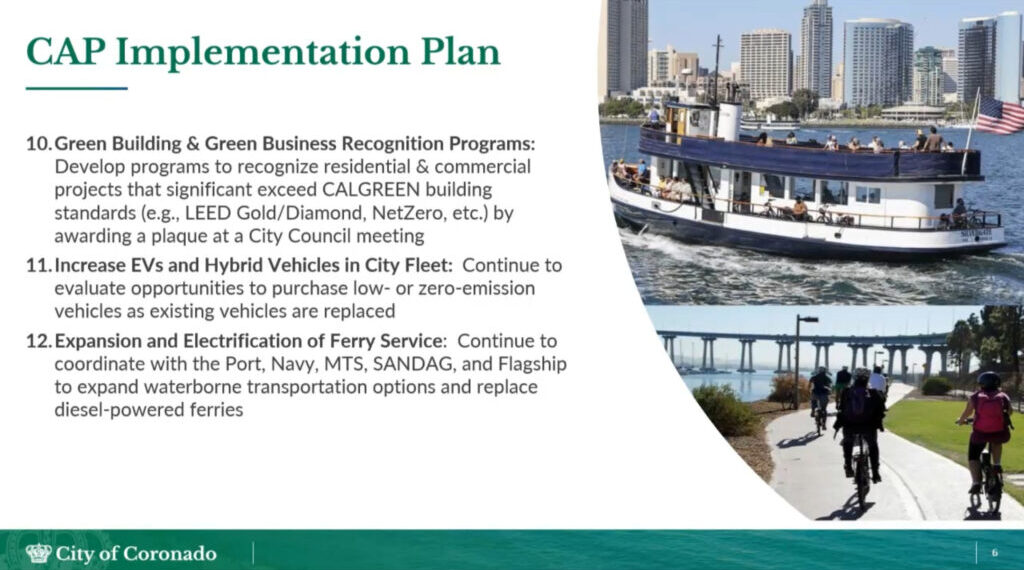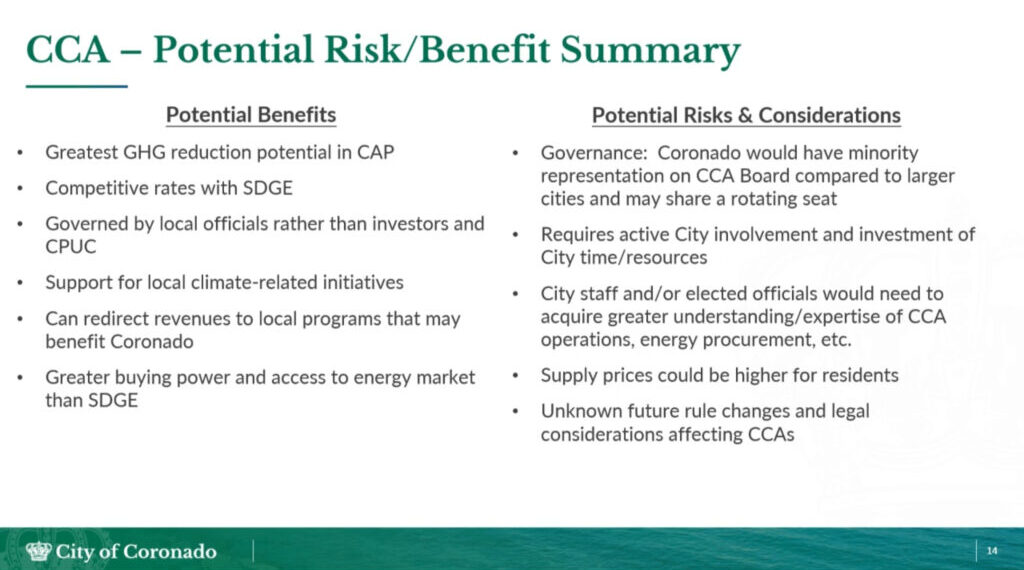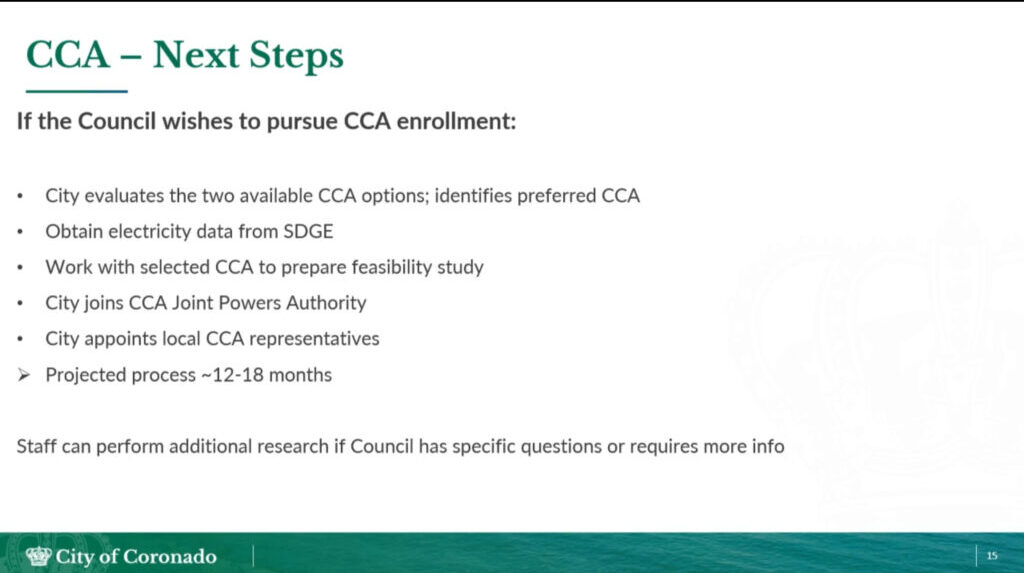Coronado City Council’s June 6 meeting covered a wide range of subjects. From the annual 4th of July festivities to Assembly Bill 46 to the Climate Action Plan, community members were inundated with information during a fruitful and productive evening.
Oral Communications
Judy Clark represented Coronado Fourth of July (CFOJ), the organization responsible for preparing and executing the various activities occurring on the island on July 4th.
“We thank you all for your support,” Clark expressed. “Without your support both in manpower and grants, this would not occur, so we are very very pleased to be your partners in this huge endeavor for the city.”
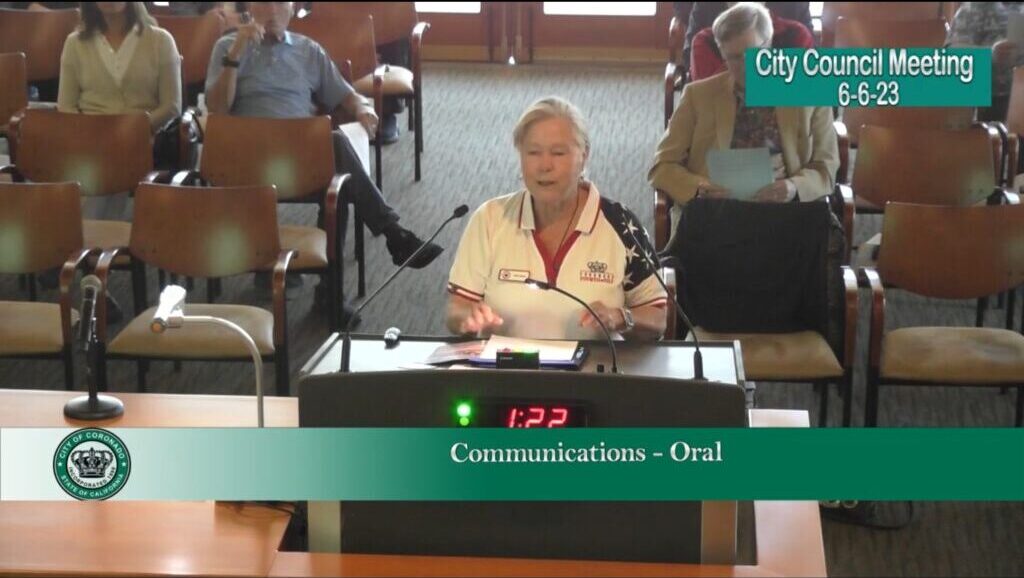
Clark also noted that the organization is still in need of about 50 volunteers, which is not unusual this far out from the event. The entire day is supported and run by volunteers only. Those interested in volunteering can sign up here.
Arun Prem is the Executive Director of RideFACT, a specialized transportation service designated by the San Diego Association of Governments (SANDAG) and the only nonprofit service that provides accessible transportation countywide.
Prem shared, “I am very proud of the support we have received from the City of Coronado’s councilmember John Duncan for specialized transportation grant funds to maintain transportation services. From his very first transportation committee meeting in SANDAG, John has spoken very clearly and passionately with fellow committee members and with SANDAG regarding the critical need to keep services like RideFACT adequately funded and also the need to sustainably fund these services. Due to John’s efforts, SANDAG has now agreed to review transportation committee’s and the board’s request to look for additional funds to support RideFACT specialized transportation services for the next two years, and I am hopeful that that will lead to results. SANDAG staff is also reassessing the scoring criteria due to John’s questions for specialized transportation grants to make sure that it’s fair and that it meets the objectives of SANDAG.”
Chris Ellinger, retired Marine Corps officer of 31 years, shared his thoughts on Assembly Bill (AB) 46, which was also discussed later in the meeting.
“I’m here to talk about AB 46 briefly prior to our advocate MOAA (Military Officers Association of America) speaking on behalf of the efforts going on in Sacramento to make California the last state to tax our military pensions. Between my wife and I we have over 60 years of service, a lot of the time being stationed here in southern California. Unfortunately, many of my comrades and many of my former Marines and peers have left the state because it was just too much of a pay cut in order to stay here, and it breaks my heart because we fell in love with California mostly because of Coronado and the special place it is.”
“Even though we’re two retired 06’s, it’s still going to be a bit of a pay cut having your pensions taxed and all of a sudden becoming California state residents, which most military people are not. This is a huge initiative. I’d like to thank MOAA for being our advocate and spearheading this effort. It’s gotten farther along than it ever has, and I think we have a real chance of making it work,” Ellinger concluded.
City Manager’s Report
City Manager Tina Friend shared three updates for the Coronado community. First, Friend reported that City Council members and staff attended the ribbon cutting for the reopening of the Cays Park Tennis & Pickleball Courts on June 5th. Phase One began in April of 2023 with construction, surveys, and community engagement and ended with a celebration of eight new pickleball courts, all of which are the first ever public pickleball courts in the City of Coronado.
Second, Friend reported that due to strikes at MTS, the Free Summer Shuttle is experiencing a delay. While the anticipated start date was June 11th, the kick off is postponed to a later date, still undecided.
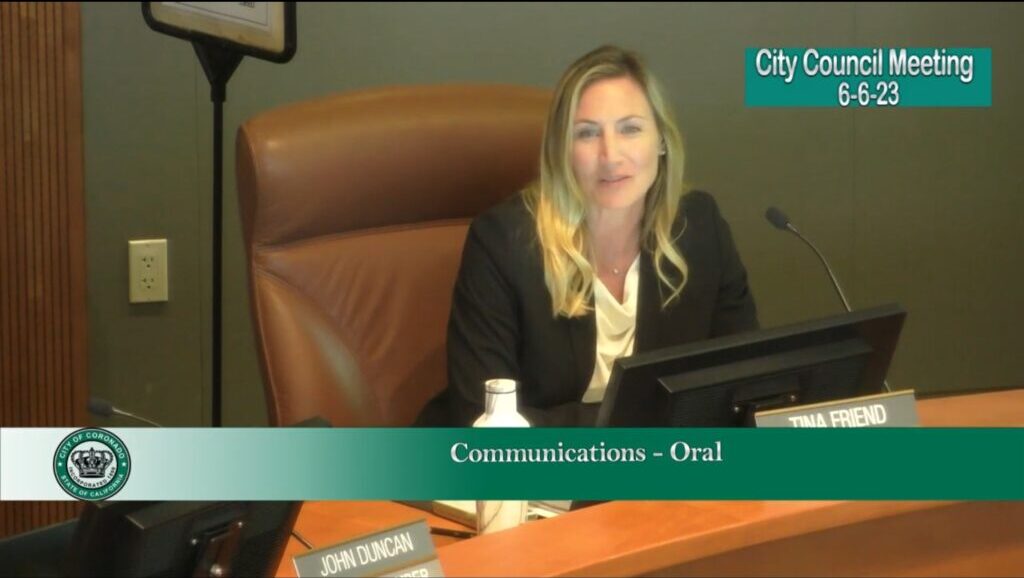
Finally, Friend provided some insight as to why beach closures have been so frequent these past couple of months. She stated that Coronado has received record amounts of rainfall, and these unprecedented rains have vastly affected the pollution of the water. For perspective, in January of 2022 Coronado received 0.16 inches of rain. In January of 2023, the city received 5.14 inches. In February of 2022 Coronado received 0.7 inches and in 2023, 1.78.
“We all remember the incredibly wet rainy first few months of the year starting December 28th. I say this because all of this rain that fell in the region and in the greater watershed of the Tijuana River contributed to really incredible record level flows down the Tijuana River. What that did was push more pollution out to the ocean environment, which then comes up by current to our coastline. That was really the major determining factor,” Friend described. “Yes, there are breaks and that was publicized and we need to pay attention to those, but really it was a lot more water pushing pollution down into the ocean.”
Although the rains tapered off to normalcy around April and May, Friend noted that it takes a significant amount of time for the watershed to drain, which is why the city is experiencing relatively high flows months after the rain.
“Talking with the IBWC (International Boundary and Water Commission) treatment plant, we’ve seen those flows drop off so that now they’re vacillating between 0 and 7 million gallons per day down from 50 and 60 and more millions of gallons per day.
“This is important because with those tapering flows it allows some really important preventive measures to take place. For instance, the IBWC crew built a sediment berm in the Tijuana River Channel that helps prevent the flows, retain some trash and garbage, and it prevents more water from spilling down the channel.”
The methodology of testing waters along the Coronado coastline has also changed. Instead of testing one spot and basing a decision upon that test, the coastline is now segmented into zones where testing is differentiated between Central, North, and South beach. This approach allows access to sections of beaches which pass the standards and closures to only the zones which fail to pass.
Assembly Bill 46
Assistant City Manager Tony Winney provided a brief summary of Assembly Bill 46, which would exclude uniformed services retirement pay and survivor benefit plan annuity payments from gross income taxes as well as provide a tax benefit for military, uniformed services, and beneficiaries.
Community member Steve Doblin shared, “I’m here in support of AB 46. Since 2010 there have been 10 bills introduced for exclusion exemption of military pay and survivor benefits. None of them have proceeded outside of the assembly. This is the first one that has proceeded to the Senate. Approximately 160,000 California residents, which includes 26,000 surviving spouses, would benefit from this legislation.”
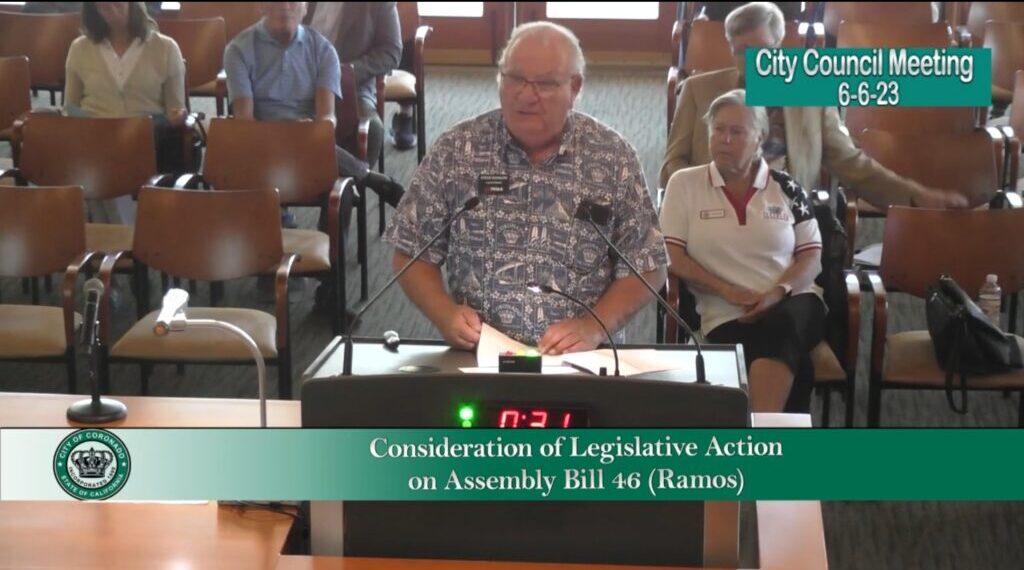
Doblin also mentioned the fact that individuals and families have been migrating from California.
“In the last ten years, there has been a 13% reduction in military retirees in California and 26% decline in surviving spouses. Nevada and Arizona, which have full exemptions, have seen sizable increases in their population. A concern for California employers right now is maintaining a qualified workforce. There are currently 60,000 high tech jobs open in California that can be easily filled by the retiring community.”
Chris Merwin, retired Navy Captain and current president of the local MOAA chapter, echoed similar thoughts.
“MOAA has been very much behind this. Talking about the cost of this bill, it’s much more nuanced than that. It may cost $50 million in the first year and $85 million in the second year, but what is not included in there is all of the taxes that we do pay. This would save me about $500 a month. I guarantee I pay significantly more than that in taxes every year, so it’s very well off set. If this bill keeps folks in (California), it will absolutely pay for itself.”
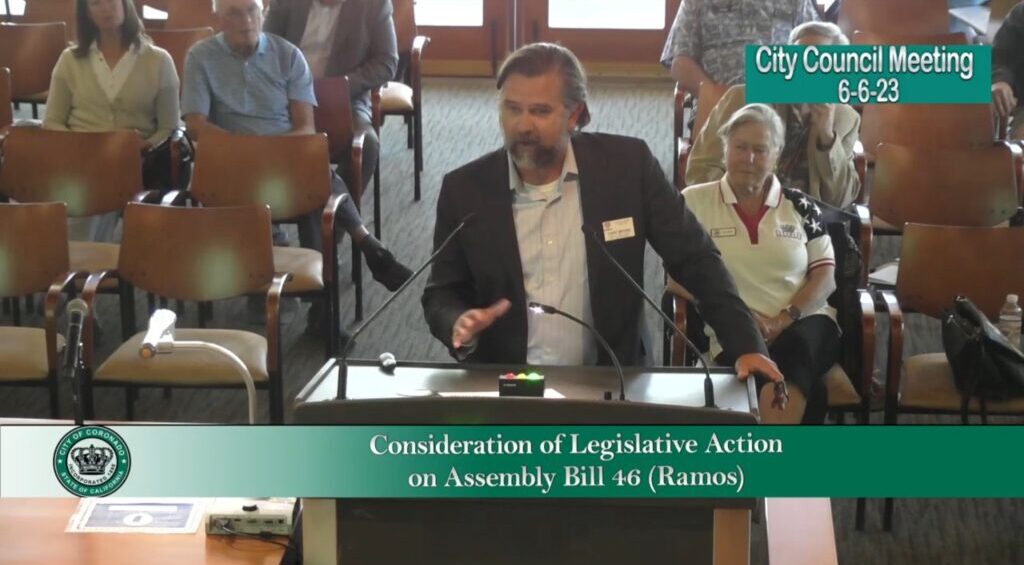
Former city councilmember Marvin Heinze also spoke at the podium.
“The issue today is why should the City of Coronado support a bill that provides tax exemption for military retired pay. What’s in it for the city? First of all, DOD military money is the biggest economic driver in San Diego County.”
Heinze went on to report that San Diego receives $36 billion in direct aid and $58 billion in gross regional product because of military defense spending.
“Other than the fact that California is the only state in the nation that fully taxes military retirement pay, something that I’m a little embarrassed about, it’s not about that, it’s about keeping highly trained workers in Coronado and in San Diego. We have lots of defense contractors in this area. They rely largely on skilled workers who got their skills in the military.
“I think the long term danger here is that as long as California is seen as an inhospitable place for the military, the military will leave and they’ll take their high skills with them. I implore the city to step up and say we are a military town and we understand the value of military service and those military retirees,” Heinze concluded.
In council deliberations, Mike Donovan commented, “I’d like to add a friendly amendment and ask that we add this to our legislative guidelines.”
The council unanimously voted to consider legislative action on Assembly Bill 46.
Climate Action Plan
The meeting then shifted to a nearly three-hour long conversation on the Climate Action Plan (CAP). Richard Grunow, Director of the Community Development Department, provided a summary of the plan including zero-emission public transportation options and Community Choice Aggregators (CCAs).
For background, the CAP was adopted by the city council in March of 2022. This comprehensive plan outlined specific activities to reduce greenhouse gas (GHG) emissions by 40% by 2030. In February of 2023, the council directed staff to evaluate a possible electric mini shuttle program, which was identified as a GHG reduction measure. The CAP Implementation Plan focuses on 12 new programs and activities that can be reasonably implemented in the next two to three years.
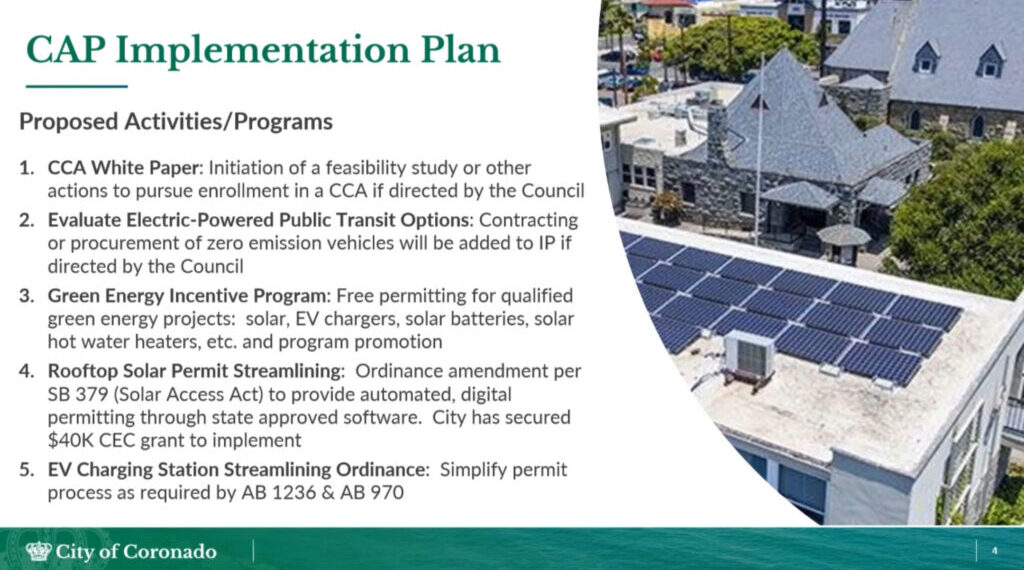
With these 12 proposed actions came various questions from councilmembers about the risks versus benefits of these different programs, including cost differentiations and the actual practicalities of each program.
In regards to the proposal #6 (EV Charging Stations), Councilmember Carrie Downey raised the point of multifamily residential infrastructures and incentives for electric vehicle charging station permits. She mentioned folks who live at the Oakwood condominiums or the Shores and asked if the infrastructure assessment could identify locations where large numbers of people do not have access to EV charging infrastructure.
“That’s certainly something that we can do,” Grunow responded. “The idea is that once we have a feasibility draft we would come back to the city council and present that information, and if the council wishes to offer some kind of incentive programs to encourage private property owners to add those charging stations that’s something we can certainly do.”
The City was also presented two zero-emission public transit options (proposal #2): Neighborhood Electric Vehicles (NEVs) and electric mini shuttles.
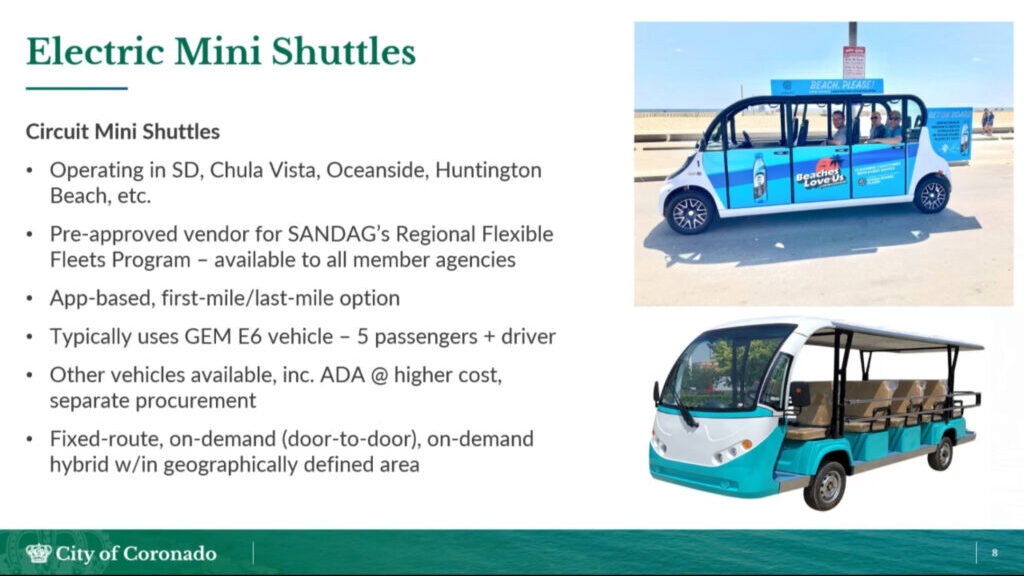 “As we did a lot of the work, it became clear to us that there’s probably several dozen ways you can cut, slice, and dice these programs, each with a different scenario, each with a resulting different cost. Each time you change a variable it could spit out a different outcome, and we did not analyze all of those not knowing where the council would want to go,” Grunow commented.
“As we did a lot of the work, it became clear to us that there’s probably several dozen ways you can cut, slice, and dice these programs, each with a different scenario, each with a resulting different cost. Each time you change a variable it could spit out a different outcome, and we did not analyze all of those not knowing where the council would want to go,” Grunow commented.
The Free Summer Shuttle was launched in 2013 thanks to funding by the city to enhance public transportation options. However, according to the Staff Report, the CAP found “transportation to be Coronado’s single largest source of GHG emissions.” The CAP also includes GHG reduction measures through public transit options such as NEVs or electric mini shuttles and electrification of the Free Summer Shuttle. Staff sought direction on questions pertaining to contracting and procurement, the costs, route types, and service periods of these different options.
In public comments, Amy Steward, president of Emerald Keepers, urged the council to move forward and implement three steps: join a CCA, pursue a better shuttle option, and encourage solarization.
“To date, citizens of Coronado have waited 15 months for the staff to review and propose prioritization of the Climate Action Plan. Not one item in the staff’s CAP Implementation Plan can be implemented without the city looking into it further or a feasibility study being conducted,” Steward commented. “This lack of forward movement is upsetting as we face a growing climate emergency, but here we are 15 months and an uncertain path forward. A viable CAP requires clarification of issues, prioritization effort, and a yardstick by which to measure progress.”
Regarding the zero-emission public transportation options, Richard Bailey had several comments on the issue.
“I find myself now asking ‘what are we really trying to accomplish with the mini neighborhood shuttles?’ And I’m not suggesting there’s no merit to it because conceptually, I’m a big fan of it and I’d like to see where this program could go. I do have hesitation and I find myself asking ‘is it the role of our city government to provide transportation services?’ I don’t believe that is one of our core functions as a local government. I don’t want us to try and compete with Uber. I don’t think we can and it’s just not a good use of tax funds in my opinion, even on a pilot basis. Mr. Duncan and Mr. Tanaka made, in my opinion, a good point that parking can be tough at times downtown, especially in the summer months. Are we trying to solve the problem of parking by providing people with shuttle services so they don’t have to park downtown? Well, if that’s the case, does the service already exist? Could they do that through Uber? I don’t know the answer to that, but I just offer that up for discussion.
“Are we trying to reduce the number of cartrips? If so, what does success look like? Those are some of the questions that I have regarding this program. I would be open to a pilot program and I would be open simply to getting staff direction to work with the SANDAG approver of Circuit and having Circuit provide us a recommendation based on the feedback they heard today. I offer those comments up so when we see a presentation on what the pilot program would look like I would like the council to give some thought to what, if any, objectives are we going to achieve. With that, I would make the motion that we do direct staff to work with the SANDAG approved vendor Circuit and to have Circuit bring us forward their recommendation based on the feedback they heard tonight at the earliest available time.”
There was much discussion on CAP proposal #1, a CCA White Paper.
Community Choice Aggregation (CCA) means that cities and counties may purchase and/or generate electricity for residents and businesses located within their community/service area.
Ultimately, each user pays a fixed rate and the ratepayers of the CCA are responsible for any costs that have to be resolved.
Regarding CCAs, Richard Bailey also commented, “I have very serious reservations with moving forward with the CCA, even with the feasibility study. The reason I have this reservation is actually a comment Mr. Tanaka made several years ago that I have borrowed from time to time, and that comment was: the greatest threat to Coronado is the state of California. One of the most egregious votes that was ever taken, in my opinion, in the state capitol was when the state actually robbed Coronado of its voice on SANDAG as well as other cities in San Diego county. I would never sign up to something that would subject the residents of Coronado to the opinions of other local officials.
“I don’t see much marginal benefit at all, but I see a lot of potential risk. This is an item where the more I’ve learned about it the less impressed I become and being pretty risk averse, I just can’t see myself ever wanting to sign up for a CCA at any point in time, especially with a lot of the unknowns that Councilmember Downey brought up. If all those unknowns get sorted out in the next couple of years as CCAs continue to mature, that can be a conversation for another day. I certainly respect council’s decision if they want to move forward with it given that it is low to no cost to the city, but I’ll just go on record to say that I’ll be opposed to that.”
John Duncan shared his thoughts. “We’re debating on whether or not we do go with changing from SDG&E, and I just don’t think we’re informed enough to make that decision. There’s just too many open questions. If we’re just going to do the feasibility study I would vote for the no cost one and not invest the $20,000 that we would have to get back so that we still have the complete ability to not go forward if we can’t deal with the risks that we’ve raised.”
Tanaka voiced his take on the proposed CCA. “I would favor moving forward with the feasibility study. If we do decide that one of those (options) is better than the other and it is a $20,000 investment to do the feasibility study, then that’s the cost of doing business. It would be better to pick the right CCA rather than eliminate 50% of our choices, so I do want to see us move ahead. Also, it’s an opportunity cost. If it does take 12-18 months we should start the clock on that. As Mr. Donovan said, we can still say no at the end of the feasibility study, but if we keep saying no at the beginning then we keep handcuffing ourselves. At some point we have to pay the opportunity costs and start the clock. I’d be happy to make the motion that we direct staff to come back to us with options for starting a feasibility study.”
In response to Councilmembers’ various questions, Grunow suggested that further feasibility studies would have to be made in order to determine the most effective routes.
“The intent is we will come back on an annual basis, report to you what we’ve accomplished, what may not have been completed, and if we get further ahead than we anticipated, maybe seek direction on new projects,” Grunow commented.
With that the council voted unanimously to direct staff to report back options for beginning a feasibility study.
The council unanimously voted “yes” to review and provide direction on the proposed Climate Action Plan.
The next City Council meeting will be on June 20th, 2023.




